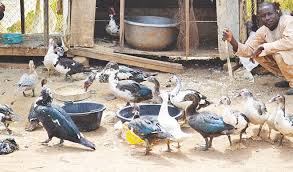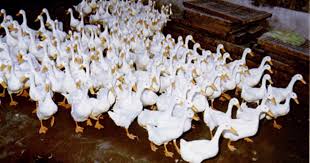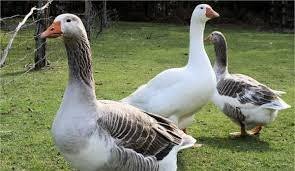![]()
If you’ve landed on this article page, you’re probably searching for a
good business idea—an idea that’s light on the pocket but heavy on
returns, promising both a fulfilling journey and potential profit.
|
How to Start Duck Farming in Nigeria
Duck farming in Nigeria is one of the lucrative poultry farming
venture practiced and in several parts of the world. Most times,
it is known to be one of the underrated poultry farming in
Nigeria because of the limited knowledge of its benefits and
techniques. Ducks have a higher level and chances of
productivity, which often requires low investment capital
compared to most poultry farming, they can be raised
commercially or by small-scale meat and egg production. Ducks
are highly accessible around the world making it a very
lucrative business to start up; the domestic ducks (waterfowls)
are mainly reared to produce meat and egg. In Nigeria, local
ducks can be raised on a free-range system varying from common
species like; Muscovy, White Pekins, Aylesbury, Blue Swedish,
Buff and several others.
Benefits of duck farming
There are many benefits and advantages to starting a duck farm
in Nigeria. To a large percentage, countries where both chickens
and ducks are raised, duck seems to rank next to chicken for the
production of meat and egg.
Some significant benefits of duck farming in Nigeria are
outlined as follows:
1. Duck farming is less expensive, simple, and less intricate
housing facilities. In such that, housing costs and expenditures
can be gotten on a minimal amount as well as setting up a
commercial duck farming business.
2. Ducks are highly resistant to most avian diseases; they are
very healthy birds and need less management and care. They can
adapt to all types of environmental conditions.
3. They can be raised on a less spaced environment since they
have relatively shorter brooding periods and their ducklings
grow fast (you can use artificial heat for the ducklings within
5-7 days, and during cold seasons longer heat periods is
necessary)
4. Duck usually live more than most consumable poultry birds and
can sustain egg production for a long period. Their eggs and
meat have a huge demand in the local and international markets;
many commercial duck farmers are making a high profit due to the
sales of these duck products (meat and egg).
Duck can lay up to 100 eggs per year depending on the specie.
They start to lay eggs at about 18 weeks of age. The
reproductive circle of duck comprises of 3 phases: Laying phase:
15 days, Incubation phase: 28-30 days, Brooding phase: 60-63
days.
If you are considering adding ducks to your farm, you will be
making a wise choice, as they will be pleasant companions and
entertain you daily while providing pest control, manure for
your soil, meat, eggs and feathers.
Breeds of Duck in Nigeria
The most common breeds of ducks common in Nigeria are:
1. Muscovy duck
The Muscovy duck ranges as the most popular duck in Nigeria, it
is believed to have originated from Central America. Because
this species of duck is well known in Nigeria, it is therefore
regulated by a free-range or backyard level system. Its plumage
is white, black, or the combination of both colours. Muscovy is
popular for its ability to adapt to high environmental
conditions and their ability to hatch and care for an average of
about 30 ducklings annually per bird. Their eggs weigh about
55-60g each.
2. Campbell duck
This variety is mostly found in modern and government research
farms in Nigeria. They are the most popular egg-producing ducks
in the world. The ducks are not valued for their meat as they
can produce 300 eggs per year if fed and taken care of properly.
Other less common varieties include Pekins, Aylesbury, Indian
Runner, and several others.
Duck farming housing
Ducks adequately sheltered will give a more productive output to
the farmer ensuring disease and hazard control with a constant
regulation of food intake and reproduction. The basic housing
requirements needed to protect ducks from heavy wind and sun is
a sheltered shady place with enough ventilation and a dry bed.
Free-range housing system
This system requires no special housing, other than housing for
night shelter with minimal disease control. The ducks are not
restricted in movement as they freely roam about ranging from
five to twenty ducks. The free-range system is a traditional
method of raising ducks in Nigeria, it is also a cheap system
that requires little investment and management.
Duck Feeding
Ducks can be fed with a variety of foods; their common food
includes fruits, cassava, corn, copra, rice, earthworm, and
grass as well as any cheaply available food and most foraging
aquatic weeds and insects which are capable of reducing cost,
they lay a big and large amount of eggs per day compared to some
poultry birds. They feed more than chickens.
Ducks on a free-range system can balance their feeding intake
since they are not restricted in movement, but when confined the
farmer must provide well-balanced feed for good productivity.
Price of Duck in Nigeria
In Nigeria, ducks are sold in the local markets. On average live
ducks are sold between #7500 – #10,500 depending on the age and
size.
A well-managed duck farming operation can yield significant
profits, with a mature duck weighing between 2-2.5kg and
producing an average of 120 eggs annually. Additionally, the
ducks can be raised on free-range systems, which is
cost-effective and requires minimal inputs.
Duck farming business in Nigeria and Africa has enormous
potential to create employment, promote food security, and
generate income for the local communities. Therefore, it is
essential to adopt sustainable farming practices and innovative
marketing strategies to thrive in this competitive industry.
Get our Practical Guide on Duck farming in Nigeria. During the
training we will define the role of an Duck farmer, discuss some
advantages of the job, describe the steps you can take to enter
the profession and provide some tips for starting a Duck farm.
|







